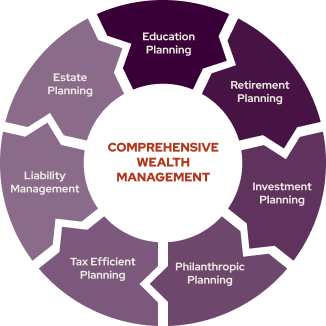What We Offer
Investment Planning
We believe investment success is largely driven by the effectiveness of your asset allocation. In our opinion, the optimal mix of investments is paramount to achieving your financial goals. To create a well-defined asset allocation plan, we incorporate these key elements:
- Customization: a strategy that takes into account your return requirements, risk tolerance, time horizon, tax situation, and liquidity needs.
- Market perspective: a focus on where we believe the market is headed rather than a reliance on past performance.
- Disciplined investment process: an approach that combines research, institutional investment strategies, and independent investment decisions.
- Accountability: an experienced, proactive team that will work hard to earn your trust towards meeting your desired outcomes.
Impact Investing
Our values-based investing services are for individuals who are interested in generating societal and environmental impact along with their investment return. No matter which causes you are passionate about, we can help find the investments that best align with your values, beliefs and priorities.
Retirement Planning
When properly planned for, retirement can be a wonderful milestone with endless possibilities. Regardless of your level of wealth, a methodical and measured approach for preserving your assets and investing your wealth is vital to helping to achieve your retirement goals and your lifestyle objectives.
Depending on your current situation and when you hope to retire, we can employ a number of strategies. There are three key issues we will consider:
- How much will you need? Generally accepted wisdom dictates that you should plan to accumulate 70 to 90 percent of your pre-retirement income for each year of retirement.
- How well prepared are you? An evaluation should include your employer-sponsored retirement plans, IRAs, pensions, and any other assets or resources you have.
- Will your investment strategy meet or exceed your target? Your portfolio should be dynamic enough to keep up with evolving financial markets, tax laws and the economic environment, as well as changes in your personal life.
1Employee Benefits Security Administration, United States Department of Labor
Tax-Efficient Planning
With the tax landscape in a perpetual state of change — and the impact of taxes undeniably pervasive — proper planning is crucial. A variety of strategies can help minimize your liability and leverage favorable provisions while they remain in force.
To navigate the intricate tax issues related to managing your wealth, we can work in concert with your tax advisor and take advantage of a number of planning opportunities. This includes:
- Timing the realization of capital gains.
- Offsetting gains and losses while paying attention to wash sale rules.
- Deducting investment interest expense.
- Utilizing charitable deductions.
- Contributing to tax-advantaged retirement vehicles.
- Considering the impact of the Alternative Minimum Tax (AMT).
Beirne does not provide tax advice
Estate Planning
Many wealthy individuals do not have fully updated or implemented estate plans. The risks of not being prepared include higher taxes and an undesirable distribution of assets, among other consequences.
The primary objective of estate planning is to maximize the amount of wealth that can be passed on to family members and charitable causes while minimizing taxes and other expenses. However, achieving these objectives requires extensive fiduciary and financial experience, along with impartial guidance.
Working with your legal and tax advisors, we offer investment and planning acumen that will help ensure every aspect of your estate plan is designed to help meet your needs. Key elements include:
- Documents: wills, durable power of attorney, and advance medical directive.
- Trusts: marital, charitable, and special needs.
- Title/ownership implications and beneficiary designations.
- Estate funding and liquidity.
- Ongoing investment management and tax planning.
Beirne does not provide tax or legal advice
Education Planning
The cost of a college education has risen faster than the rate of inflation for nearly four decades. The average cost of an undergraduate degree rose 169% over the four decades leading up to 2020. 2 And no matter how prepared you are to afford the expense, you should ensure you are taking advantage of every tax deferral opportunity and the most effective investment vehicles available.
Whether you are planning for your children’s education or the next generation, there are a number of strategies to consider. We can help you evaluate the relative benefits of various options, such as:
- Uniform gifts/transfers to minors’ custodial accounts
- Coverdell education savings accounts (ESA)
- 529 savings plans
- Trust structures
2Georgetown University Center on Education and the Workforce Report
Philanthropic Planning
One of the great joys of achieving financial success is the ability to support the organizations and causes that are most important to you.
We can help by evaluating the tax and portfolio implications of gifting specific assets to charity and by working with your tax and legal advisors to establish a more complex philanthropic plan. Your options can range from a simple gift of cash or securities to a multigenerational strategy involving a variety of vehicles and holdings:
- Gifting highly-appreciated or low-cost-basis assets
- Gifting real estate
- Gifting IRA assets
- Investing in donor-advised funds
- Creating charitable trusts
- Establishing a private family foundation
Beirne does not provide tax or legal advice
Liability Management
Ready access to credit is a vital component of a comprehensive wealth management plan. Whether you require short-term financing, leverage to diversify your portfolio or funds to purchase real estate or artwork, access to liquidity is crucial.
Based on your overall financial goals, a strategic approach to liability management can provide opportunities to maximize earnings and optimize cash flow through structures like:
- Secured and unsecured loans
- Letters of credit
- Mortgage financing
- Margin accounts
- Hedging strategies


